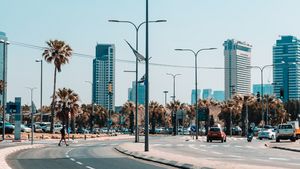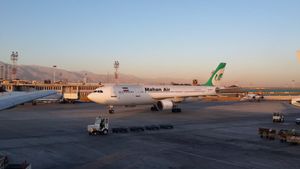JAKARTA - The Legislative Body of the DPR has scheduled a draft law (RUU) for Maternal and Child Welfare (KIA) to be brought to the Plenary Meeting on June 30 to be ratified as a DPR initiative bill.
The MCH Bill will be continued at level I discussion after a response from the government through a presidential letter (Surpres) and the provision of a Problem Inventory List (DIM).
Member of the Legislation Body (Baleg) of the DPR Luluk Nur Hamidah, stated that the DPR did not play around in making the MCH Bill. The reason is, this bill regulates the obligation of workplaces to provide daycare facilities or child care.
“The state's alignment with services for the fulfillment of rights for mothers and children is no joke through this MCH Bill. Because we manage from upstream to downstream,” Luluk told reporters, Monday, June 27.
Luluk explained that one of the objectives of the MCH Bill is to ensure the interests of children's growth and development, especially in the first 1,000 days of a child's life.
According to him, the effort so that these interests can be fulfilled is by providing facilities and infrastructure, both in public spaces and in the workplace.
"Facilities and infrastructure (sarpras) that must be provided such as the availability of daycare, play rooms, and lactation rooms that must be fulfilled by any party, especially managers of public infrastructure or at work," he explained.
The rules regarding the obligation to provide daycare, play rooms, and lactation rooms are contained in the draft of the MCH Bill Chapter 3 Article 22 and Article 23. Article 22 states that the provider or manager of public facilities and infrastructure must provide convenience in the use of public facilities, facilities and infrastructure. for Mother and Child.
Providing convenience in the use of public facilities and infrastructure for mothers and children includes support for facilities at work, public places, and public transportation. The facility support referred to in Article 22 Paragraph (3) of the MCH Bill is in the form of providing lactation rooms, providing child care rooms, day care areas, and children's play areas.
“Meanwhile in Article 22 Paragraph (4) of the MCH Bill it is regulated that the support for facilities and infrastructure at the workplace as referred to in Paragraph (2) is given to working mothers in the form of adjustments to tasks, working hours, and/or workplace while taking into account the conditions and work achievement targets," said Luluk.
This member of Commission IV of the DPR also emphasized that providers or managers of public facilities and infrastructure that do not implement the provisions as referred to in Article 22 will be given guidance and/or administrative sanctions in accordance with the provisions of laws and regulations, including for offices.
“Daycare in the workplace cannot be considered a simple matter if we understand the benefits. This daycare also ensures that mothers or parents can still work productively, calmly, comfortably, and even give breast milk for more than 6 months, "explained Luluk.
“And what is certain is that the needs or rights of children can still be met. Especially in terms of monitoring developments, and also the mental health of children in the future," he added.
The MCH Bill also highlights the importance of strengthening preferential treatment in the first 1,000 days of a child's life, which is in line with the results of various scientific studies. According to Luluk, the issue of child growth and development must be a common concern, especially through policies.
“According to the London Journal of Primary Care, building a strong bond with a child in the first two years of his life is crucial and will determine the next important times of life into adulthood. The best investment for families, communities and the Indonesian nation is a superior, healthy, intelligent and productive generation," said Luluk.
The member of the PKB faction in the DPR assessed that the state should be able to ensure that mothers have the best opportunity to breastfeed while monitoring the mental, physical, psychological, and social development of children at an early age. Given that it is important to determine the success of children's growth and development.
One of the efforts that can be done is by initiating additional maternity leave for working mothers from 3 months to 6 months. In addition, Luluk said, by providing facilities and infrastructure such as lactation rooms to daycare at work.
"The state must ensure that this policy must be taken if it does not want to lose in the future," he said.
On the other hand, Luluk added, the PKB faction views that the current welfare of mothers and children in Indonesia is not sufficient. This can be seen from the Maternal Mortality Rate (MMR) in Indonesia which is still very high at 305 per 100,000 live births based on the 2015 AKI Inter-Census Population Survey (SUPAS).
Luluk said that the SUPAS results made Indonesia one of the countries with the highest MMR in the Southeast Asian region. PKB also considers that preventive services and proper handling are needed to overcome the stunting rate in Indonesia which is still quite high.
"To suppress the stunting problem in Indonesia, the MCH Bill can be a guide in realizing the welfare of mothers and children since the mother enters the preparation period before pregnancy, during pregnancy, during childbirth and after childbirth until the child reaches a certain age," Luluk said.
In the discussion of the MCH Bill, Luluk ensured that the DPR and the government would listen to the aspirations of all stakeholders, including from the company side and always the employer, during the discussion process.
"We hope that everything will run smoothly. Personally, I encourage related parties to be able to prioritize the interests of children's growth and development because this concerns the future of the next generation, which we hope can become superior human resources for the progress of the nation," said Luluk.
The English, Chinese, Japanese, Arabic, and French versions are automatically generated by the AI. So there may still be inaccuracies in translating, please always see Indonesian as our main language. (system supported by DigitalSiber.id)













